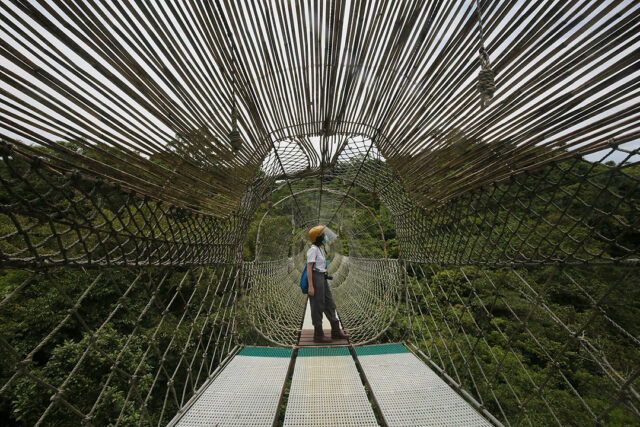
The View From Taft
By Maria Adiel H. Aguiling

A sanctuary of flora and fauna lies in the mountains of Rizal. Masungi Georeserve is a picturesque terrain of limestone and verdure. It contains wildlife, rope trails and rock-climbing routes. My favorite part of the conservation area is the long and wide rope bridge called Great Hammock or duyan. Our path was from the hanging net atop a slope to the Yungib ni Ruben way below. It required balance and courage to merit a respite with a breathtaking view.
Bridges are pathways from one side to another. They symbolize connection and unity.
Educational institutions serve as bridges to knowledge, character, and work. In universities, we capacitate students to become competent professionals. And in our college, we prepare them to be socially responsible practitioners.
In an introductory class in the doctoral program, our professor informed us that our college “aims to bridge faith and business practice.” Those words struck a chord with me. I understood it as living by one’s faith in business transactions.
As a new faculty, I embarked on cascading our organizational mission. I strove to convey the message through my corporate social responsibility and governance classes. This subject aimed to expand social and environmental awareness and refine moral sensitivity before ethical dilemmas. I was uncertain of how I communicated and how they assimilated the course objectives, so I required my students to submit a reflection paper before the end of the term.
I summarize the highlights of their reflection into four points.
• Exercise social and environmental responsibility. “Businesses have a moral obligation to ensure their operations are ethical and sustainable at every stage of their supply chain,” said Pranay, one of my students. Companies ought to discover the practices of their suppliers; and squash child labor, discrimination, and any harm on nature.
• Think ethically before acting. Actions have consequences on the organization, people and the environment. Business is not only for profit. It is important “to make decisions that lead toward the common good and not only for one’s gain,” Louie stressed.
• Be grateful for what you have and optimize your talents. Christianne said. “God has given us many talents. It is up to us to decide how to use them. Let us not waste these opportunities and set our eyes on greater things for the greater good of society.” Ralo added that we humans have the wisdom and capability to innovate and regain lost resources.
• Hold tight to your moral values in doing business. Juliana noted that “as a child of God, I believe we should not let money control us.” Jeff also shared his resolve to “work with a value system strongly anchored on morally right ethics and good conduct.”
The students developed ideas on working with ethical principles. Moreover, Maynard, Bianca, Nathaniel and many others started to adopt a sustainable lifestyle. They shifted from driving to commuting and walking, reduced power consumption, reused and recycled bags, thought twice before buying, researched companies and patronized only sustainable products. Nicole said: “With consumerism prevalent nowadays, it took a lot of effort to move away from that mindset and be purposeful in what I buy.” Finally, several students motivated relatives and friends to perform acts of kindness and conservation. Aya encouraged her mom to control her temper when dealing with employees. Regarding a family trip, Isha recalled, “instead of swimming, my cousins and I chose to do a beach clean-up.”
The effort to bridge faith and business is not only for teachers and students.
The document entitled Vocation of the Business Leader: A Reflection by the Dicastery for Promoting Integral Human Development invites all business leaders to bear witness to God’s kingdom. It enjoins entrepreneurs and managers to create good goods, good work and good wealth for human dignity and the common good.
A reflective pause will help us digest these aspirations. Inspired by the document, we should examine and ask ourselves: Why am I in business? Do I share my prosperity to improve society? How do I uplift the lives of others? How can my company reduce waste and contribute to a green environment? How do I integrate Gospel principles into my work?
Like the Great Hammock bridge, bridging faith and business requires steadiness and virtue. And it promises the delight of discovering a purposeful life. I wish you all had a meaningful Holy Week.
Maria Adiel H. Aguiling is an assistant professorial lecturer at the De La Salle University, RVR College of Business. She is a trustee of the Foundation for Professional Training, Inc.
maria.adiel.aguiling@dlsu.edu.ph